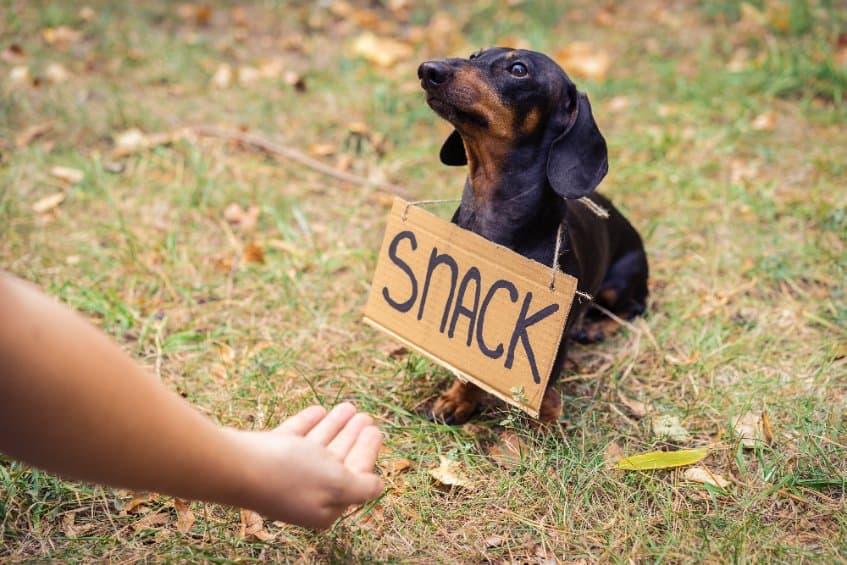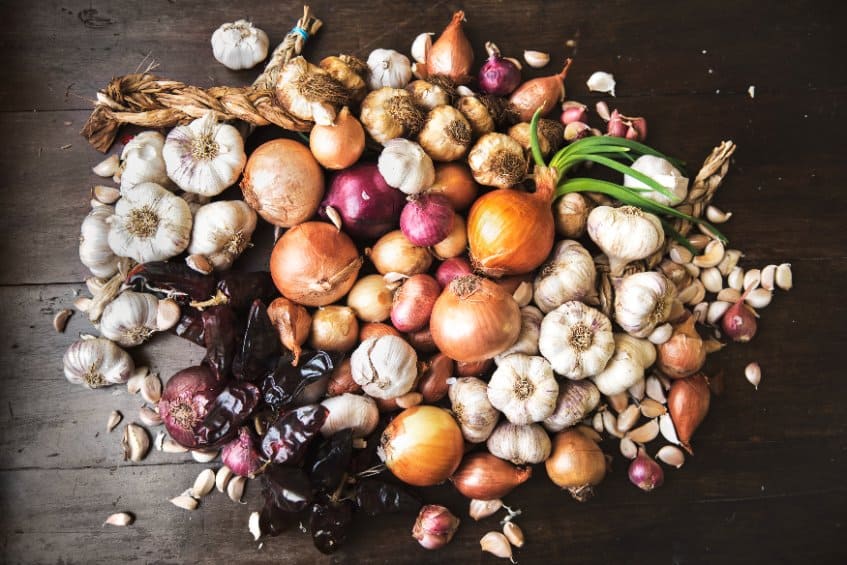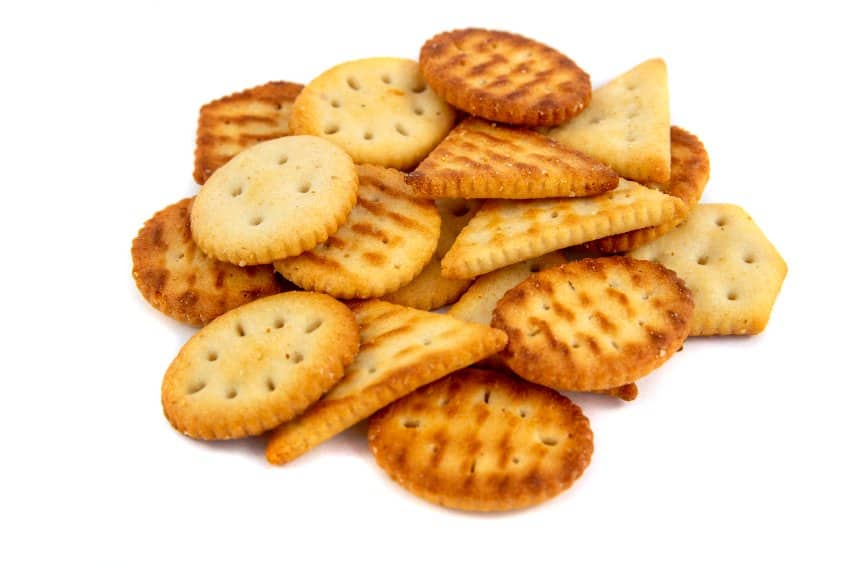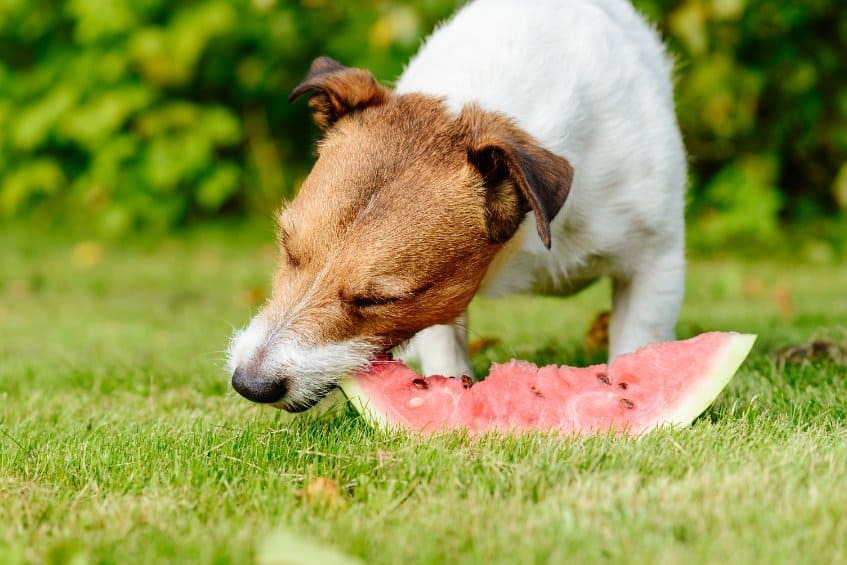
Everybody loves at least one type of cracker and our dogs often want a bite of them as well. Can my puppy safely eat crackers though?
Puppies can eat crackers. However, it is best to avoid giving puppies crackers with large amounts of salt or garlic. Crackers also don't provide much nutrition for puppies, so they should only be given in small amounts.
A lot of puppies will eat just about anything if you let them, even if it's not good for them, so it is important to check. We'll go over what you should watch out for when giving your puppy crackers so that they stay healthy.
Crackers are high in Salt
One of the things you want to watch out for when considering whether or not to give your dog crackers is the high salt content of crackers.
Dogs need salt in their diet like almost any other animal, but they get plenty of it in their dog food and other treats they may have. Giving them more salt than that is not a good idea.
Too much salt intake will cause your dog to become very thirsty, meaning you have to give more water and make frequent trips outside. A large amount of salt can lead to vomiting, diarrhea, and other serious problems.
When deciding if you should give a puppy a cracker it's best to opt for crackers that have less salt. A lot of crackers come in low salt options that would be a better food choice for your dog.
Crackers With Garlic Are Not Good for Dogs

Many crackers have garlic on them, and garlic is not good for dogs. Garlic and other members of its family like onions and chives contain large amounts of thiosulfate, which is toxic to dogs and can cause damage to their red blood cells, giving the dog hemolytic anemia.
“Symptoms of anemia include pale mucous membranes, rapid breathing, lethargy, weakness, jaundice, and dark colored urine.”
American Kennel club
Garlic can also cause the following symptoms in puppies.
- Vomiting
- Diarrhea
- Loss of appetite
- Abdominal pain
- Depression
- Dehydration
The small amount of garlic in the crackers you're eating is unlikely to seriously harm your puppy, but it's best to completely eliminate it from your dog's diet.
You should also check your crackers for onion powder, which has the same negative health effects on dogs as garlic.
Crackers are High in Calories
One of the downsides of crackers is that they generally lack any nutritional value and are high in calories. Like many other processed human foods, we add a lot of sugar to our crackers. Sugar and carbohydrates will have some of the same negative health effects on dogs that they do on humans.
Crackers do contain grains that are actually good for dogs to have. Dogs can eat wheat and oats and get some benefits from those, but the amount of grains in a lot of crackers is not enough to make up for the other ingredients.
Crackers Should Only Be Given as a Treat, Not a Meal
Crackers should only be given to puppies in small quantities as a treat and not as part of their meal. Your dog may love the taste of crackers, but most crackers provide very little to no nutritional value to puppies. If you have crackers every day and tend to throw your pup one each time, your dog will likely get sick.
There are some crackers out there that have fewer calories and salt on them that would probably be better for your dog, but it's best to look for other snack options that won't potentially impact the health of your dog.

Can Puppies Eat Cheez-its?
Cheez-its are a very popular cracker, but they are not good for dogs. One Cheez-it will likely not hurt your puppy, but it's not a good treat to give to them. Cheez-its are high in sodium, fat, and calories.
Can Puppies Eat Ritz?
One Ritz cracker is unlikely to hurt your dog, but Ritz crackers are not a good snack for dogs. While also being high in salt, Ritz crackers contain a lot of sugar in them that will eventually cause health problems for your dog if they eat too many over time.
Can Puppies Eat Wheat Thins?
Puppies can eat Wheat Thins, but like the other crackers mentioned in this article, they should only be given to your dog in small amounts. Wheat thins, like Ritz and Cheez-its, are packed full of sugar and salt. The crackers also don't provide any significant source of nutrition for your puppy.
What Is a Good Alternative Treat?

You don't need to feel like you can only give your puppy his dog food. While dogs have some diet restrictions compared to humans, they are capable of eating a lot of different things. Many people think that dogs are meant to be carnivorous and only eat meat, but dogs are actually omnivorous and can eat many grains, vegetables, meats, cheeses, and fruits.
Giving your puppy a variety of different treats is great for your dog. Dogs are very intelligent animals and can easily get bored. Mixing up the treats you give them will give them is a good way to keep them stimulated.
Here is a list of some treats that are good for your dog!
- Cheese (especially low-fat cheese like mozzarella)
- Apples
- Blueberries
- Watermelon
- Coconut
- Boiled Eggs
- Cooked Fish
- Peanut Butter
- Popcorn (preferably plain without butter and salt)
It is important to remember that treats should be given in small amounts during the day and dogs should have a diet of good dog food that gets them all of the nutrients that they need. Treats, when given in small amounts, will not harm your dog, even if you give your dog treats multiple times a week. If your dog eats too many treats, it will likely become overweight.
While many fruits are okay for your dog to eat, you should never give your dog grapes or raisins. These are toxic to your dog and can result in kidney failure.

Cindy is a prolific writer and online researcher who can't imagine life without dogs. There is scarcely a dog topic she has not researched or written about. Her love for dogs and helping dog parents is evident by the thousands of dogtemperament.com visitors who read her articles monthly. Most of all, each topic Cindy writes on helps forge a stronger bond and understanding between her and her happy Catahoula Leopard Dog Jossie.